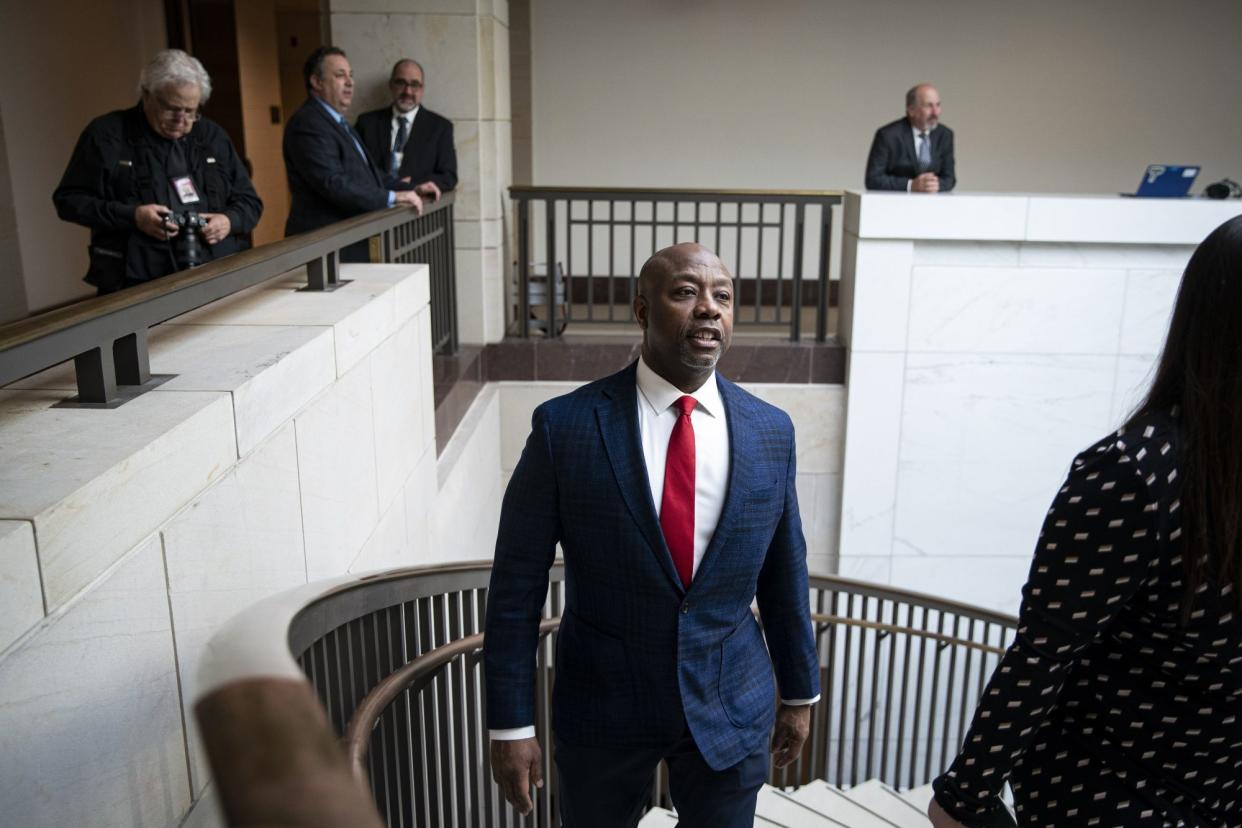GOP Senators Filled the 2016 Debate Stage. Not This Time.

(Bloomberg) -- Family time. Desire to reshape the party. Attachment to the US Senate. These are the reasons ambitious but low-polling Republican senators cite for avoiding a toe-to-toe contest with former President Donald Trump to be the GOP’s 2024 nominee.
Most Read from Bloomberg
Passengers Take 16-Hour Flight to Nowhere After Auckland to New York U-Turn
Lesser-Known Hedge Fund Boss Joins Ranks of Best Paid With 193% Gain
Tim Scott of South Carolina is the only Republican senator sending signals he’s weighing a White House run. He’s a proven fundraiser, is traveling to early primary states and sharing his against-the-odds success story. Even so, he’s polling at about 1%, according to a Morning Consult poll out this week.
Senators have long struggled to cut direct paths for themselves to the White House, and only Barack Obama has succeeded in the last 60 years. But that hasn’t stopped others from trying.
In 2016, the long GOP roster included four sitting senators, dividing the party and helping Trump ultimately win the nomination. President Joe Biden, a senator before becoming Obama’s vice president in 2009, ran against a field of Senate Democrats in 2020, but none rose to the top.
“I think President Trump is by far the most likely to become our nominee,” Senator Mitt Romney of Utah, the party’s 2012 nominee who voted to convict Trump in both his impeachment trials, said.
Romney said the only realistic chance to beat the president is if the field quickly narrows to a two-person race next year. “If there are 10 people with one message and one person that has a different message then that person is going to win,” he said.
Though not yet a candidate, Scott, the only Black Republican in the Senate, is touring key states like Iowa, raising money and planning a speech Thursday in his home state. Like former South Carolina Governor Nikki Haley, who announced a presidential bid on Tuesday, Scott is pushing a sunnier and more optimistic view of conservatism than Trump.
Scott has demonstrated fundraising prowess. A super political action committee allied with Scott, the Opportunity Matters Fund, raised $37.3 million in 2021 and 2022, according to the nonpartisan group OpenSecrets. Much of that was spent on campaign ads to help GOP candidates in the midterm elections, a tried and true way of building support within the party.
Scott also raised $51.7 million for his reelection last year. Top contributors included employees and political action committees of Apollo Global Management Inc., Goldman Sachs Group Inc. and Visa Inc.
Senator Ted Cruz of Texas, the runner-up for the 2016 GOP nomination who polled at 3% in the Morning Consult poll, told reporters this week that he plans to seek reelection. Neither Marco Rubio of Florida nor Rand Paul of Kentucky, both 2016 candidates, are planning presidential runs either.
Other Republican senators thought to have White House ambitions have said they don’t plan to run next year, including Josh Hawley of Missouri, Tom Cotton of Arkansas and Rick Scott of Florida.
One likely factor: Senators have largely been lumped together as “someone else” in polls dominated by Trump and Ron DeSantis, the governor of Florida, who has yet to announce a run but already is a favorite among many Republican Party donors.
Cotton cited wanting to spend time with his young family in a brief interview Tuesday, pointing out that he taught one son to ride his bicycle on a recent weekend when he otherwise would have been making a political trip to lay the groundwork for a campaign.
“You don’t get that time back,” he said.
Rubio, who came in third among Republicans in 2016, said Trump is still the favorite to win the nomination.
“President Trump, in my view, is a very talented communicator for the modern era and has already won the nomination once before,” Rubio said.
But Haley, Rubio added, is “a talented person with a great story to tell.” He expects others to enter the race, too.
“It looks like Tim Scott’s pretty serious about it, he’d be a great candidate; obviously Governor DeSantis has become very popular across the country,” Rubio said.
Hawley said he’s focused on growing the party instead of preparing for a presidential campaign. Haley, he said, was right to say Republicans must address the fact that they’ve lost the popular vote seven of the last eight elections.
“We are not at the moment a popular majority party in the country and we’re not gonna be until we bring working class voters over decisively to our side,” Hawley said.
Paul, a libertarian-minded Republican, cited one issue that, he said, resonates with many voters: Stopping funding for Ukraine and redirect the money to invest in America instead.
“I don’t know if it’s popular enough to win the presidency,” he acknowledged. He said he’s not actively planning a run, though he joked he might consider it if someone raised him a few hundred million dollars.
Most Read from Bloomberg Businessweek
The Staged Bomb Scare That Backfired on Mumbai’s Notorious Cops
Putin’s War Is Crippling Ukraine’s Economy—and Russia’s, Too
©2023 Bloomberg L.P.



